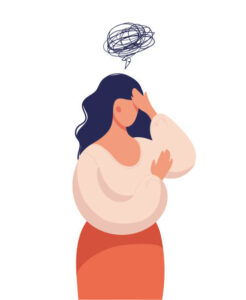We all know that superstitions are silly, right? Just a collection of irrational beliefs that have no basis in reality. Or do they? What if there is more to superstitions than we realize? What if they can actually have a powerful impact on our lives, for better or for worse? In this blog post, we will explore the dark side of superstitious beliefs and how they can take over our lives.
Contents
What Is Superstitious OCD?

Before understanding the disorder, let’s revise what the words superstitious mean. It is an irrational belief that an object, action, or circumstance not logically related to a course of events influences its outcome. It may arise from fears of the unknown or anxiety about the future. For example, you may believe that if you step on a crack in the pavement, you will break your mother’s back.
These beliefs are usually based on magical or mystical thinking. They often have their roots in religious or cultural beliefs. And they can be passed down from generation to generation. But just because something is a superstition, it doesn’t mean it can’t cause problems in our lives. In fact, for some people, superstitious beliefs can become so all-consuming that they develop a condition called Superstitious OCD.
Superstitious OCD is a type of Obsessive-Compulsive Disorder in which a person becomes fixated on lucky and unlucky numbers, objects, colors, words, etc. They may believe that if they don’t perform certain rituals or follow certain rules, something bad will happen to them or their loved ones. These can manifest in a lot of different ways and vary from person to person. While some actions may seem harmless and even funny or quirky, too much of them can start to take a toll on a person’s mental and physical health.
How Is It Different From Scrupulosity?

Scrupulosity, a term used to describe religious OCD, is similar to superstitious OCD in that it involves very strict rules and rituals. The main difference is the focus of these beliefs. While scrupulosity revolves around moral or ethical issues, superstitious OCD focuses on lucky and unlucky omens.
It is also important to note that not all superstitions have a religious meaning or origin. They may be based on cultural beliefs or personal experiences. And you don’t have to be religious to develop superstitious OCD.
One must also keep in mind that while the fears in religious OCD or scrupulosity circle around the possibility of sinning or going to hell, the fears in superstitious OCD center around bad luck. For example, a person with scrupulosity may avoid using certain words for fear of blasphemy, while a person with superstitious OCD may avoid certain words because they believe it will bring them bad luck.
Lastly, a major difference between the two disorders is that people with scrupulosity tend to be more accepting of their OCD, while people with superstitious OCD are more likely to be in denial about their condition. They may even get defensive or aggressive when confronted about their beliefs. This is because superstitions are often seen as silly or irrational, so people with the disorder may be embarrassed or ashamed to admit that they believe in them. But the truth is that superstitious OCD is a real and serious condition that can have a profound impact on life.
What Are Some Examples Of Superstitious OCD?
To understand this condition better, we will look at some instances that happen in daily life. OCD as a disorder has two major components: obsessions and compulsions. Obsessions are intrusive and unwanted thoughts, images, or urges that cause anxiety or distress. Compulsions are repetitive behaviors or mental acts that a person feels compelled to do in order to reduce the anxiety caused by the obsessions. Let’s take a look at both of them through examples.
Obsessions
Some of the most common thoughts and obsessions in superstitious OCD can include:

- Fear of breaking mirrors, because it’s considered bad luck
- Belief that certain numbers are lucky or unlucky
- Fear of black cats, because they’re considered to be bad omens
- Spitting over your shoulder after hearing a crow cawing, because it’s considered to be an unlucky sign
- Carrying a lucky charm or wearing a specific item of clothing for good luck
- Touching wood or knocking on wood, because it’s considered to be a way to ward off bad luck
- Blowing out all the candles on a birthday cake after making a wish, because it’s considered to be a way to make the wish come true
- Making a wish on a shooting star, because it’s considered to be a way to make the wish come true
- Saying “rabbit rabbit” on the first day of the month, because it’s considered to be a way to ensure good luck for the rest of the month
These are just some examples, obsessive thoughts can be about anything from the above or something else. The possibilities are endless.
Compulsions

Now that we are aware of the thoughts and ideas in the mind, we will learn some compulsions and behaviors which people engage in. These include doing things such as:
- Obsessively re-checking everything
- Tapping, blinking or making sure objects are touching
- Avoiding people, places, animals, or objects associated with the fear
- Excessive cleaning and/or hand-washing
- Organizing in an extreme way
- Repeating words, numbers, or actions
- Hyperfixation and paranoia
- Hoarding objects
- Extreme need to receive attention or reassurance
- Praying excessively or performing religious rituals
- Getting anxious, sad, irritable, or even panicked when superstition is not followed
These are only some examples of compulsions, as stated earlier the list can be endless. The list goes on and on, but these are just a few examples. The main point is that people with superstitious OCD will often do things to try to prevent their fear from coming true.
What Are The Causes?
Just like any other mental health condition, superstitious OCD is a complex and dynamic disorder with a variety of possible causes. Some possible causes include:
- Genetic factors: OCD can run in families, which suggests that there may be a genetic component to the disorder.
- Brain structure and function: abnormalities in certain areas of the brain have been linked to OCD. It is said that people with OCD may have a problem with the way information is processed in their brains.
- Hormonal imbalance: Neurotransmitters such as serotonin and dopamine play a role in OCD. An imbalance of these chemicals has been linked to the development of OCD.
- Environmental factors: Some research suggests that exposure to certain toxins or infections such as strep throat can trigger OCD.
- Stressful life events: It is believed that stressful life events can contribute to the development of OCD. People may turn to rituals and compulsions as a way to cope with stress.
- Childhood issues: Lastly, if someone was raised in a household where there was a lot of criticism or perfectionism, they may be more likely to develop OCD.
It is important to remember that there is no single cause of OCD. Rather, it is thought to be the result of a combination of the given factors.
How Does It Effect Life?

While some superstitions may seem harmless, they can actually have a dark side. For some people, superstitious beliefs can become so all-consuming that they can start to consume aspects of a person’s life and lead to severe consequences.
- Physical problems: It is no secret that physical and mental health are interconnected. When a person is dealing with a mental health condition such as OCD, it can take a toll on their physical health. This is because chronic stress can lead to a variety of physical health problems such as:
Headaches
Stomach problems
Hypertension
Stroke
Sleep issues
Weight gain or loss
Heart disease
All these conditions can be a root cause of severe issues in the body.
- Emotional imbalance: When we are constantly stuck in a cycle of anxiety and fear, it can lead to emotional problems such as:
Anxiety
Low functioning
Memory problems
Paranoia
Loss of interest in activities
Low self-esteem
All these can result in the depletion of quality of life.
- School/work: OCD can also take a toll on a person’s academic and professional life. This is because the symptoms of OCD can interfere with concentration and focus. Additionally, OCD can lead to a lot of absenteeism as people may miss school or work in order to engage in their compulsions. It can also keep productivity low due to the same reason.
- Social life: OCD can also put a strain on personal relationships. This is because the symptoms of OCD can be very time-consuming and disruptive. Additionally, people with OCD may avoid social situations altogether out of fear of their symptoms being triggered. This can lead to feelings of isolation and loneliness. One may be constantly in fear of being labeled as a “freak” or being ridiculed.
- Self-harm: Lastly, when the burden of the obsessive thoughts and compulsions becomes too much to handle, some people with OCD may turn to self-harm as a way to cope. This can include:
Cutting
Hitting oneself
Pulling out hair
Picking at skin
Banging head against a wall
Verbal abuse of self
Attempting suicide
These are just some of the ways in which OCD can negatively impact a person’s life. All of these consequences are disturbing, but they are a reality for many people who suffer from this condition. If you or someone you know is struggling with OCD, please reach out for help. There are many resources available to provide support and treatment. OCD is a serious condition, but it is treatable.
Tips To Deal With Superstitious OCD
Luckily, despite all the difficulties, there are various ways through which one can deal with Superstitious OCD. One of the most important things is to understand that you are not alone in this battle. This is a common condition that affects many people. It is nothing to be ashamed of. There are a lot of people who understand what you are going through and are willing to help.
Some of the other tips that can be useful in dealing with this issue include the following methods.
Seek professional help
Seeking aid from a mental health professional is the foremost step that should be undertaken. It can help you get to the root of this condition and start working on it. It also provides a non-judgmental, safe, and confidential environment in which to discuss your experiences. Most professionals may use therapy to help you, but in severe cases, medications may be necessary. Some of the most popular therapeutic approaches include:

- Cognitive-behavioral therapy (CBT): It works by helping you to identify and change the negative thoughts and behaviors that are causing your OCD.
- Exposure and response prevention (ERP): It is a type of CBT that involves gradually exposing yourself to the things that trigger your OCD while learning to control your urge to engage in compulsions.
- Acceptance and commitment therapy (ACT): It is a type of therapy that helps you to accept your thoughts and feelings without trying to change them. It also teaches you how to commit to living a life that is in line with your values.
- Dialectical behavioral therapy (DBT): It is a type of therapy that helps people change their thinking and behaving pattern and learn how to manage their emotions.
The right type of therapy approach will be a decision between you and your therapist. If your symptoms are too severe or have a biological basis, you may be prescribed medication. The most commonly prescribed medications for OCD are:
- Selective serotonin reuptake inhibitors (SSRIs): These work by increasing the levels of serotonin in the brain.
- Tricyclic antidepressants (TCAs): These work by affecting different neurotransmitters in the brain.
- Anti-psychotics: These work by affecting the levels of dopamine in the brain.
The decision to medicate will be a joint decision between you and your psychiatrist.
Practice grounding and relaxation techniques
If you tend to get overwhelmed by your thoughts, it can be helpful to practice some grounding and relaxation techniques. These can help you to focus on the present moment and calm your mind. Some of the most popular techniques include:
- Progressive muscle relaxation: This involves tensing and relaxing different muscle groups in the body.
- Deep breathing: This involves taking slow, deep breaths and focusing on the sensation of the breath going in and out of your body.
- Mindfulness: This involves paying attention to the present moment without judgment.
- Yoga: This involves a combination of physical postures, breathing exercises, and meditation.
- Tai chi: This is a form of martial arts that involves slow, graceful movements.
- Guided imagery: This involves picturing a peaceful place in your mind and focusing on the details of that scene.
- Activation of senses: This involves focusing on a specific sense (sight, smell, sound, taste, or touch) and paying attention to the details of that sense.
All of these can help you to feel more present and calm. They can also divert your mind and hold you back from engaging in compulsions.
Journal your thoughts

Journaling has many benefits for mental health. It can help to relieve stress, work through emotions, and boost self-esteem. For people with OCD, journaling can be a way to track your thoughts and progress in treatment. It can also be a form of exposure therapy, as it can help you to face your fears and work through them. Some things you may want to journal about include:
- Your thoughts and compulsions
- The triggers for your OCD
- How your thoughts and behaviors makes you feel
- Your progress in treatment
- Any new insights or realizations about your OCD
Your journal can be as long or as short as you want it to be. The important thing is that you are writing down your thoughts and feelings.
Adapt to resistance
This might be easier said than done, but it’s important to try to adapt to resistance. This means that when you start to feel the urge to engage in a compulsion, you don’t fight it. Instead, you let yourself experience anxiety and discomfort. This can be a difficult process, but it is essential for recovery. Remember that the anxiety will eventually pass, even if it feels unbearable at the moment. This can make you feel like you are not making any progress, but it is a normal part of the process.
Establish a routine
Having a well-established and consistent routine can help to reduce OCD symptoms. This is because it can provide a sense of structure and predictability. Routines can also help to reduce anxiety and stress. Some things you may want to include in your routine are:
- Regular mealtimes
- Exercise
- Sleep
- Medication
- Therapy
- Free time
- Stick to your treatment plan
Having your tasks in place can reduce your urges to go off track and hence lessen your compulsions.
Utilize your support system

It is no secret that human beings are social creatures. We need connection and support from others. This is especially true when we are going through a difficult time. If you have OCD, it’s important to utilize your support system. This can include family, friends, therapist, and support groups. These people can offer you practical and emotional support. There are many OCD support groups available, both in-person and online. These can be a great way to connect with others who understand what you’re going through. Support groups can provide social support, information, and resources. They can also offer an opportunity to expand your network and meet with people facing similar issues.
Enhance self-esteem
One of the biggest factors that drives us into engaging in compulsions is because we want to avoid anxiety and discomfort. However, this can often lead to feelings of shame and self-loathing. It’s important to remember that you are not your OCD. It is a part of you, but it does not define you. This can involve:
- Exploring your values and beliefs
- Challenging negative thoughts
- Building self-compassion
- Identifying your strengths and weaknesses
- Setting realistic goals
- Practicing self-care
- Engaging in positive self-talk
- Doing things that make you happy
Enhancing your self-esteem can be a key part of treatment and recovery.
Find other hobbies
Sometimes, our compulsions can take over our lives and consume all of our time. This can leave us feeling isolated and alone. It’s important to find other hobbies and activities that you enjoy. This can help to reduce feelings of isolation and give you a sense of purpose. It can also help to take your mind off of your OCD. Some things you may want to try are:

- Hiking
- Volunteering
- Gardening
- Dancing
- Crafting
- Reading
- Playing an instrument
These are just a few things that you can do to help manage your superstitious OCD. Remember, recovery is possible. Seek professional help if you are struggling to manage your symptoms on your own.
Superstitious OCD can be a very debilitating condition, but with proper treatment, it is possible to manage the symptoms and live a full and satisfying life.
Conclusion
In conclusion of the above, superstitious OCD is a rather dark side of beliefs that can have harmful consequences on an individual’s life. There are many ways to treat OCD, but it is important to find what works best for you. Remember that recovery is possible and you are not alone.
If you or someone you know is struggling with OCD, please reach out to Therapy Mantra for help. We have a team of highly qualified mental health professionals who can provide you with the treatment and support you need. Contact us today to book an online therapy session or download our free OCD treatment app on Android or iOS for more information.


